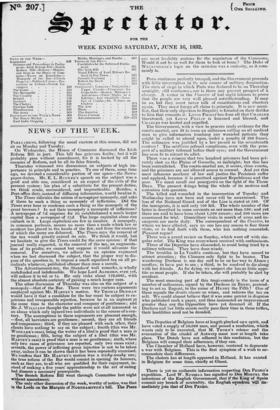NEWS OF THE WEEK.
PARLIAMENT, following the usual custom at this season, did not sit on Monday and Tuesday. On Wednesday, the House of Commons discussed the Irish Reform Bill in part. This bill has grievous faults ; but it will probably pass without amendment, for it is backed by all the enemies of Reform, and by all its false friends.
Thursday witnessed two discussions on subjects of high im- portance in principle and in practice. To one of them, some time ago, we devoted a considerable portion of our space—the News- paper-duties. Mr. R] BuLkvna's speech on the subject was a good and able one, considered as an exposo of the evils of the present system : his plan of a substitute for the present duties, we think crude, unconsidered, and impracticable. Besides, a Post-office filitY, instead of diffusing information, would localize it. The Times ridicules the nOtien-Of new,spaper-mtmopoly, and -asks if there be such a thing as monopoly of inflictions. Did the Times ever hear or condemn such a thing as the monopoly of the • great brewers ? Is not their monopoly a monopoly of inflictions? 21. newspaper of 7d. requires for its establishment a much larger capital than a newspaper of 3114. The large capitalist alone can embark in it. Large capitalists are few in number. A monopoly, in -common parlance, means no more than a trade which law or accident has placed in the hands of the few, and from the exercise of which the many are de-barred. The Times says the removal of tire tax would greatly extend its sale. We think it would, but we hesitate to give the Times credit for the same opinion : if that journal really expected, in the removal of the tax, an augmenta- tion of its profits, we cannot but suppose it would advocate the removal. For ourselves, we adhere to an opinion expressed when we last discussed the subject, that the proper way to dis- pose of the question is, to impose a small equalized tax on all pe- riodicals whatever, published oftener than once a month. The Advertisement-tax, the Standard well remarks, is wholly undefended and indefensible. We hope Lord ALTHORP, even yet, will reduce it to 6d. or 1s. He only risks about 120,0001., with the almost absolute certainty of gaining a much larger sum. The other discussion of Thursday was also on the subject of a monopoly—that of the Bar. There were two curious arguments employed against Mr. HARVEY'S motion. Sir THOMAS DENMAN would have it that a candidate for the bar must be subject to ca- pricious and irresponsible rejection, because he is an aspirant at the same time to the character and company of gentlemen ; and Mr. J. WILLIAMS thought the public were not at all interested in an abuse which only injured two individuals in the course of a cen- tury. The assumptions in these arguments are pleasant enough, —first, all barristers are gentlemen; second, they are all friends and companions; third, if they are pleased with each other, their clients have nothing to say on the subject; fourth (this was Mr. WOOLLER'S case), being the writer of a libel is Proof that a man is no gentleman; fifth, being the subject of a libel (this was Mr. HARVEY'S ease) is proof that a man is no gentleman; sixth, where only two cases of grievance are reported, only two cases exist; seventh, the power of inflicting gross injustice is not to be taken away, unless it can be shown that it has been repeatedly exercised. We confess that Mr. HARVEY'S motion was a wishy-washy one; the true reform of the Bar would consist in opening its honours, such as they are, to all who are qualified for their enjoyment, in- stead of making a five years' apprenticeship to the art of eating bad dinners a necissary Prerequisite. The Scotch Reform Bill went through Committee last night without amendment: The only other discussion of the week, worthy of notice, was that ii) the Lords on the Marquis of NORTHAMPTON'S bill. The Peers are most laudably zealous for the regulation of the Commons. WOuld it not be as well for them to look at home? The Duke of WELLINGTON'S logic on the occasion was a curiosity, as it com- monly is. - • •



























